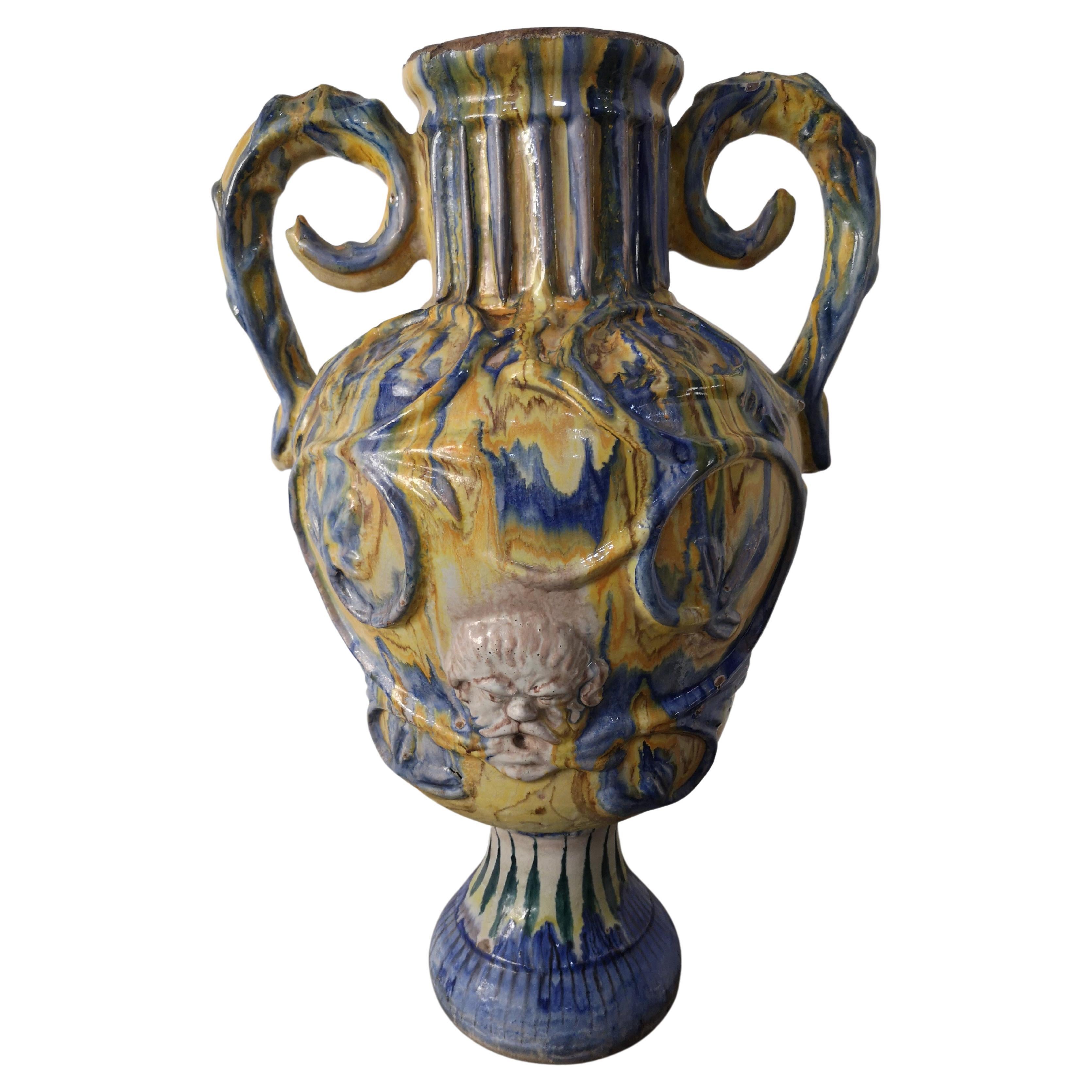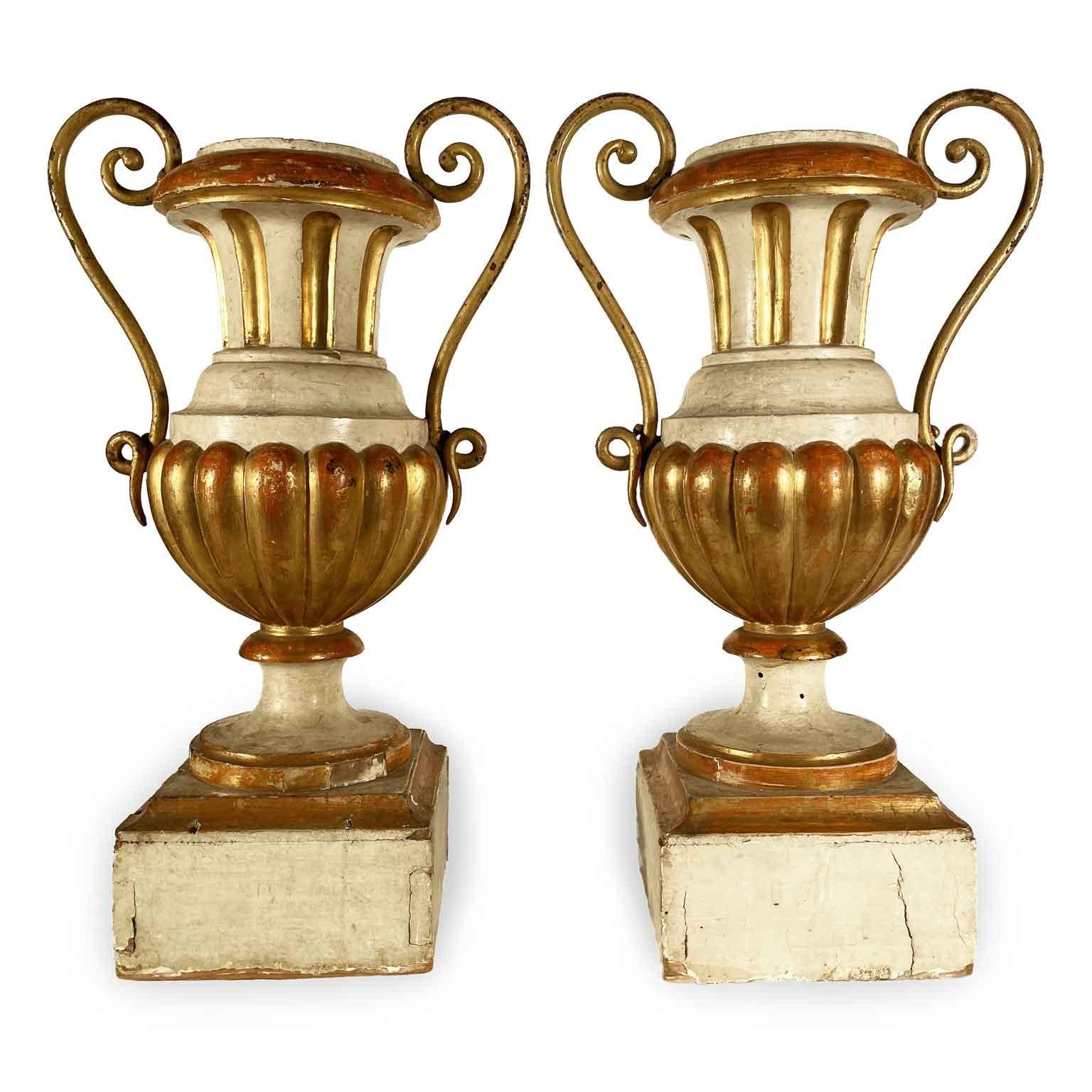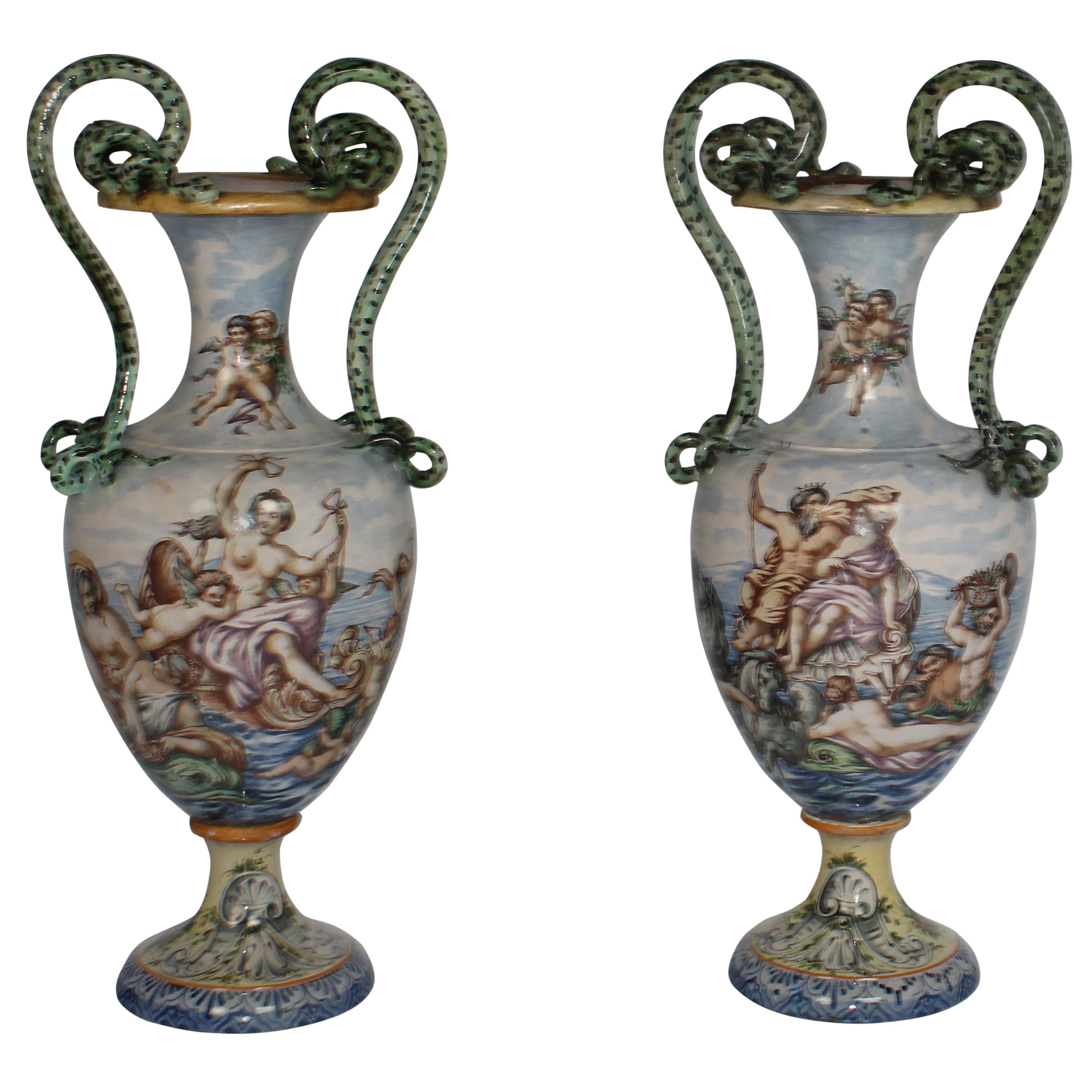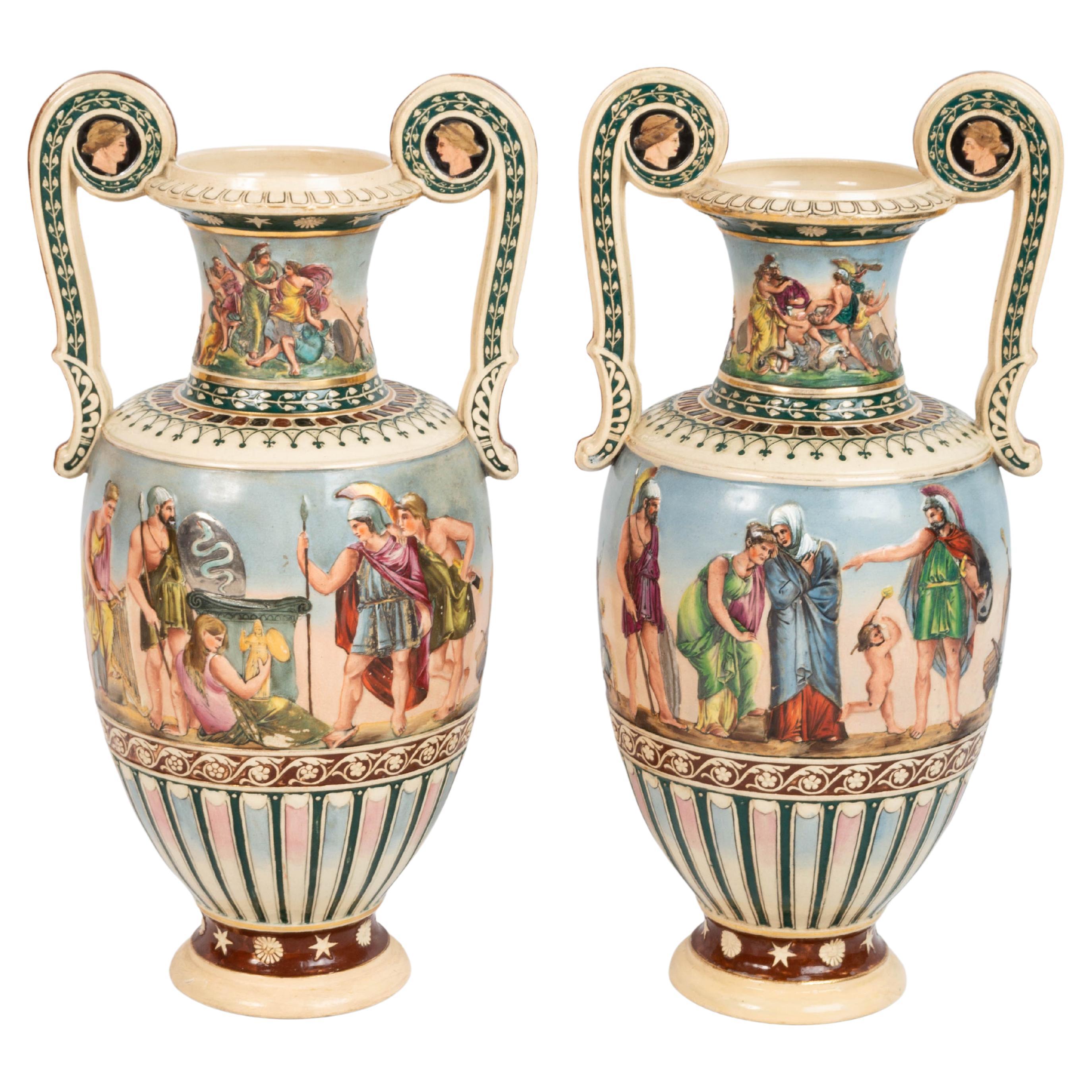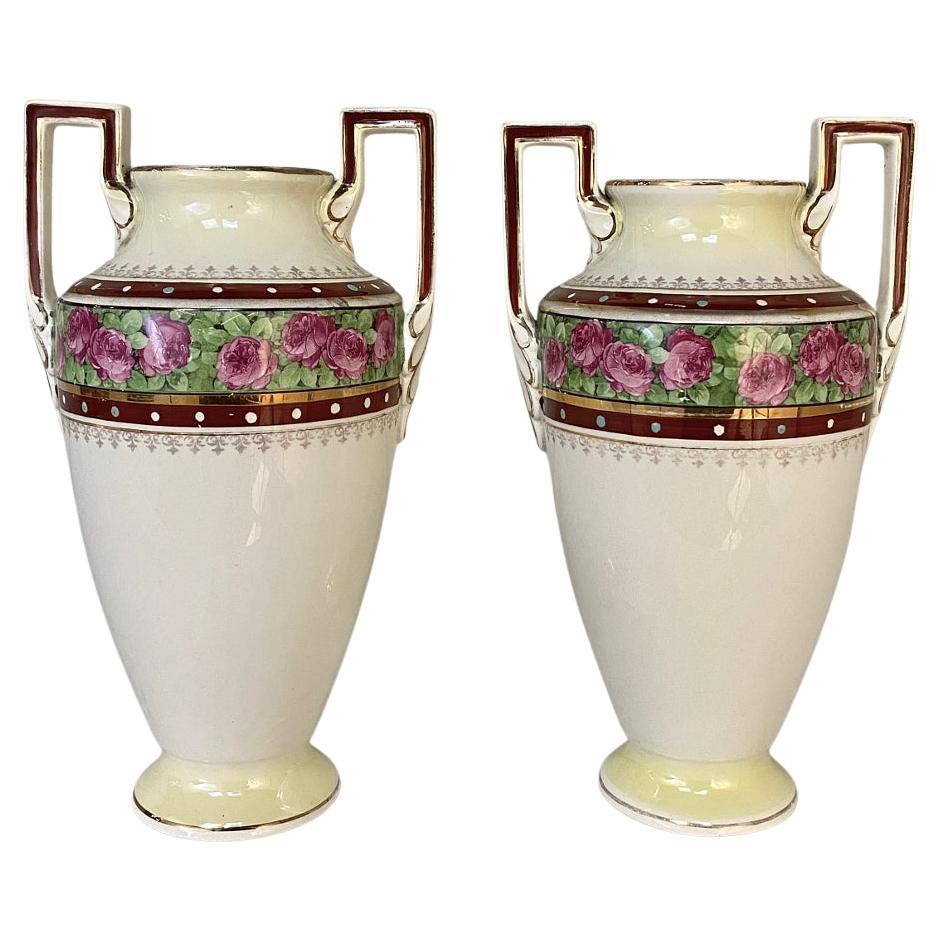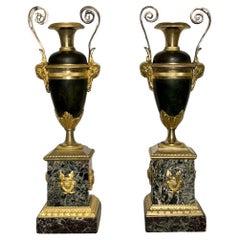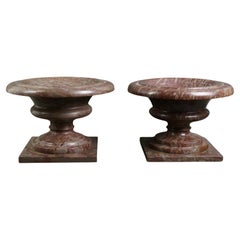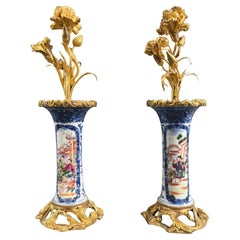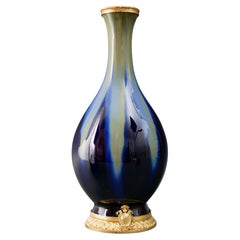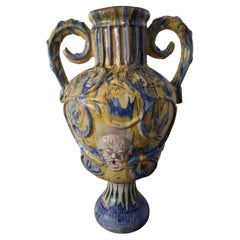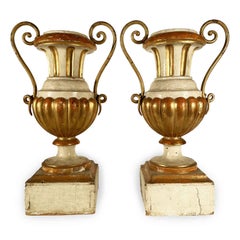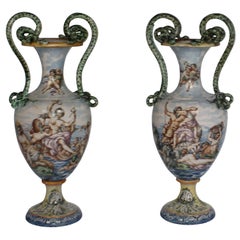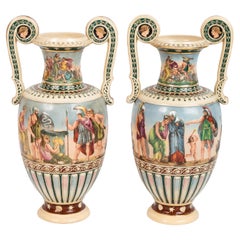Items Similar to Rare pair of Neoclassical Alabaster and Scagliola Urns Florence 18th century
Video Loading
Want more images or videos?
Request additional images or videos from the seller
1 of 16
Rare pair of Neoclassical Alabaster and Scagliola Urns Florence 18th century
$15,526.68
£11,545.09
€13,000
CA$21,807.96
A$24,008.95
CHF 12,271.03
MX$286,553.28
NOK 156,236.35
SEK 146,202.39
DKK 99,044.47
About the Item
Pair of neoclassical alabaster and polychrome scagliola urns, Florentine workshop, last quarter del XVIII secolo. Provenance: dukes of Fitz-James and heirs.
This rare pair of neoclassical urns comes to us from a prestigious legacy, that of the Paris branch of the Fitz-James dukes. The title Duke of Fitz-James first appeared in France under Louis XIV, created by the same king in 1710 for James FitzJames, 1st Duke of Berwick, an illegitimate son of James II of England. James II of England had bestowed the title of Duke of Berwick among the English nobility on his son, who was fathered by his mistress Arabella Churchill. After the glorious revolution of 1688, which dethroned James II, Berwick went into the service of Louis XIV, who appointed him marshal of France in 1703 . His eldest son is the architect of the Spanish branch of the Dukes of Berwick, which, under the name Fitz-James Stuart, now unites several Spanish greatnesses, including that of the Duke of Alba. His youngest son is the architect of the French branch of the Dukes of Fitz-James, which distinguished itself for seven generations until its extinction in the mid-20th century.
The Fitz-James' Parisian estate counted on an impressive collection dating mainly from the late 18th and early 19th centuries of art objects, miniatures, "souvenirs," portraits, and historical mementos. In particular, our vases were jealously guarded in the library.
Almost certainly this pair of urns was made on commission specifically for the Fitz-James, as no other comparable specimens can be found, and they were almost certainly made by a Florentine workshop in the era of the Grand Tour: in the late 18th and early 19th centuries Rome and Florence were the main centers of production of fine artifacts that harked back to ancient times, but the use of materials such as Volterra alabaster and scagliola as well as the shape of the vases, which echoes Etruscan models, leave no doubt about this.
Volterra alabaster, the finest in Europe, with its delicate, opalescent color, almost transparent to light, was masterfully decorated with the technique of scagliola, carving its surface and then filling it with stucco and decorating it in polychrome in imitation of hard stone. Art objects such as these are extremely rare, to etch the curved, thin surface of the vase without breaking it took the great masters of the workshop.
The result, which we can still admire today, are two beautifully preserved, softly colored urns. The course of time has, it is true, left its marks: there are some spinning due to stresses on the material and some points where it was necessary to intervene by gluing parts that had become detached, but these are old interventions that required neither reconstruction nor repainting and are most noticeable by exposing the vases to light, as the alabaster is translucent. We are dealing with two practically unique pieces that have come down to us after more than two centuries of history, and we need to be able to appreciate them as they are, without trying to hide the wounds.
- Dimensions:Height: 14.97 in (38 cm)Width: 5.91 in (15 cm)Depth: 5.91 in (15 cm)
- Style:Neoclassical Revival (Of the Period)
- Materials and Techniques:
- Place of Origin:
- Period:
- Date of Manufacture:circa 1780
- Condition:Wear consistent with age and use. Minor structural damages.
- Seller Location:Pistoia, IT
- Reference Number:1stDibs: LU10131242779162
About the Seller
No Reviews Yet
Vetted Professional Seller
Every seller passes strict standards for authenticity and reliability
Established in 1997
1stDibs seller since 2024
Typical response time: <1 hour
- ShippingRetrieving quote...Shipping from: Pistoia, Italy
- Return Policy
Authenticity Guarantee
In the unlikely event there’s an issue with an item’s authenticity, contact us within 1 year for a full refund. DetailsMoney-Back Guarantee
If your item is not as described, is damaged in transit, or does not arrive, contact us within 7 days for a full refund. Details24-Hour Cancellation
You have a 24-hour grace period in which to reconsider your purchase, with no questions asked.Vetted Professional Sellers
Our world-class sellers must adhere to strict standards for service and quality, maintaining the integrity of our listings.Price-Match Guarantee
If you find that a seller listed the same item for a lower price elsewhere, we’ll match it.Trusted Global Delivery
Our best-in-class carrier network provides specialized shipping options worldwide, including custom delivery.More From This Seller
View AllClaude Galle (1759-1815) Pair of French Directoire Urns or Vases Bronze Ormolu
By Claude Galle
Located in Pistoia, IT
Pair of bronze and marble urns from the Directory period attributed to Claude Galle (1759-1815).
The two ovoid urns are cast in alternating patinated bronze and mercury-gilt bronze...
Category
Antique Late 18th Century French Directoire Urns
Materials
Marble, Bronze
Pair of Large Red Onion Marble Vases Italy 19th century
Located in Pistoia, IT
Pair of large vases in the neoclassical taste in red Roman cipollino marble, Italy, late 19th century. Of great decorative effect,they are made from a quality of fine marble already...
Category
Antique Late 19th Century Italian Neoclassical Revival Vases
Materials
Marble
Pair of Louis XV Bronze and Porcelain Chinoiserie Candlesticks 18th century
Located in Pistoia, IT
Pair of Louis XV-era candlesticks in gilt bronze and chinoiserie-painted porcelain, 18th century period. The two delightful candlesticks are made of authentic 18th-century Chinese va...
Category
Antique 18th Century French Louis XV Candlesticks
Materials
Bronze
Gustave de Bruyn Glazed Ceramic and Gilt Bronze Vase Art Deco France XX
By Gustave De Bruyn
Located in Pistoia, IT
Beautiful French Art Deco glazed ceramic vase with gilded bronze mount bearing the mark of potter Gustave de Bruyn in Fives-Lille. Antoine Gustave De Bruyn, called Gustave, (Dec. 9, ...
Category
Early 20th Century French Art Deco Vases
Materials
Bronze
Large Neoclassical Cache-pot Vase in Green Marble Rome 19th Century Grand Tour
Located in Pistoia, IT
Imposing serpentine marble vase, also called "Prato green." Rome, neoclassical period, first half of the 19th century.
In the Neoclassical period Roman workshops produced fine marble...
Category
Antique Early 19th Century Italian Empire Planters, Cachepots and Jardin...
Materials
Marble
Marble inkwell Souvenir of the Grand Tour Rome late 18th century
Located in Pistoia, IT
Capital-shaped white marble inkwell, souvenir of the Grand Tour, Roman workshop, late 18th century.
Rome was considered the stop par excellence of the Grand Tour, as it represente...
Category
Antique 18th Century Italian Classical Roman Inkwells
Materials
Marble
You May Also Like
Caltagirone ceramic amphora, mid-19th century
Located in Catania, IT
Caltagirone ceramic amphora with satyr mask, mid-19th century.
Category
Antique Mid-19th Century Baroque Vases
Materials
Ceramic
Coppia di Vasi Neoclassici Italiani Laccati Avorio e Dorati Manici In Ferro 1780
Located in Milano, MI
Coppia Di Vasi Circolari In Legno Laccato color avorio e dorato con curvi manici in ferro battuto e dorato, appoggiati su di una alta base quadrata laccata in color avorio che sostie...
Category
Antique 18th Century and Earlier Italian Neoclassical Revival Vases
Materials
Wrought Iron
Italian Faience Hand-Painted Urns
Located in Pomona, CA
Late 19th century hand-painted Italian urns. The urns depict men, women, and angles in the ocean. The colors are soft but the handlers are painted in green and black in snack pattern...
Category
Antique Late 19th Century Italian Urns
Materials
Pottery
$1,500 / item
Pair English 19th Century Greek Revival Vases C.1830
Located in London, GB
Pair of English 19th century Greek Revival vases
England, C.1830
Staffordshire pottery
A pair of pottery vases decorated in a Grecian style ...
Category
Antique 19th Century English Greek Revival Vases
Materials
Pottery
$10,836 / set
Pair Antique Keramis Vases
Located in Dallas, TX
Pair Antique Keramis vases is a splendid example of craftsmanship from the famous maker out of Belgium, with a classical shape inspired by ancient Greek a...
Category
Vintage 1930s Belgian Neoclassical Revival Vases
Materials
Porcelain
$688 / set
Rare Pair of Neoclassical Porcelain Vases, Possibly Russian, Early 1800s
Located in New York, NY
A rare pair of Neoclassical period porcelain vases, possibly Russian from the early 1800s. The gilt porcelain vases are decorated with raised bisque garlands of flowers and porcelain...
Category
Antique 19th Century Vases
Materials
Porcelain
More Ways To Browse
Italian Scagliola
18th Century Italian Vessel
Italian Alabaster Vases
Antique Alabaster Vase
Antique Sette
Blue Sevres Urns
India Urn
Pineapple Urn
Antique Cloisonne Urn
French Tole Urns
Green Large Urn
Serves Urn
Signed French Urn
Champleve Urn
Chinese Black Urn
Large Moroccan Vase
Neoclassical Black Marble Urn
Antique Pottery Urns
